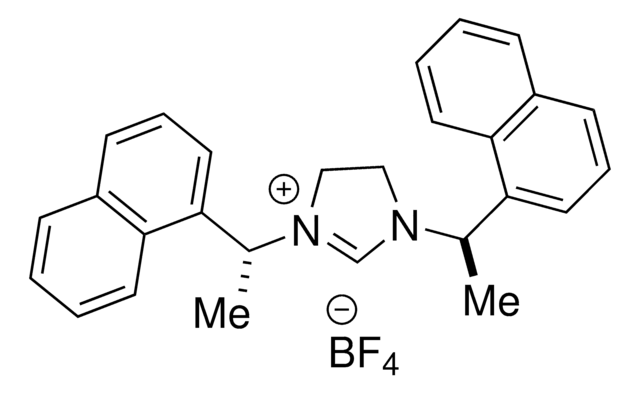683973
(5aR,10bS)-5a,10b-Dihydro-2-(2,4,6-trimethylphenyl)-4H,6H-indeno[2,1-b]-1,2,4-triazolo[4,3-d]-1,4-oxazinium chloride monohydrate
93%
Synonym(s):
Bode Catalyst 2
About This Item
Recommended Products
Quality Level
Assay
93%
form
solid
optical activity
[α]20/D +158°, c = 1 in chloroform
mp
226-230 °C
functional group
ether
SMILES string
[Cl-].Cc1cc(C)c(c(C)c1)-[n+]2c[n@@H]3[C@@H]4[C@@H](Cc5ccccc45)OCc3n2
InChI
1S/C21H22N3O.ClH/c1-13-8-14(2)20(15(3)9-13)24-12-23-19(22-24)11-25-18-10-16-6-4-5-7-17(16)21(18)23;/h4-9,12,18,21H,10-11H2,1-3H3;1H/q+1;/p-1/t18-,21+;/m1./s1
InChI key
GUECWMLEUCWYOS-WKOQGQMTSA-M
General description
Application
- In the preparation of dihydropyridinones by reacting enals or α′-hydroxyenones with vinylogous amides via aza-Claisen annulations.
- In the oxidative coupling reactions of di(hetero)arylmethanes with enals to yield benzimidazole fused lactams.
- In the synthesis of organosilanes by reacting enals with β-silyl enones.
Legal Information
Signal Word
Warning
Hazard Statements
Precautionary Statements
Hazard Classifications
Eye Irrit. 2 - Skin Irrit. 2 - STOT SE 3
Target Organs
Respiratory system
Storage Class Code
11 - Combustible Solids
WGK
WGK 3
Flash Point(F)
Not applicable
Flash Point(C)
Not applicable
Personal Protective Equipment
Choose from one of the most recent versions:
Already Own This Product?
Find documentation for the products that you have recently purchased in the Document Library.
Articles
Rovis has demonstrated that triazolium salt in the presence of a base can act as an N-heterocyclic carbene organocatalyst1 in highly enantioselective intramolecular Stetter reactions.
Related Content
The Bode Group aims to develop new reactions and reagents for the synthesis of complex molecules. The Bode Group has developed N-mesityl-substituted NHCs as organocatalysts for the catalytic generation of reactive species including activated carboxylates, homoenolates, and enolates. These novel catalysts and reactions have made possible a new generation of highly enantioselective annulations from simple starting materials under mild reaction conditions, usually at room temperature and without added reagents. Furthering the goal of designing new reagents to enable the assembly of complex molecules, the Bode group has developed SnAP reagents for the facile, one-pot conversion of aldehydes into N-unprotected, saturated N-heterocycles, including bicyclic and spirocyclic structures. These easy to handle reagents provide a simple and robust alternative to the challenging and restrictive cross-coupling methods for the functionalization of saturated N-heterocycles.
The Bode Group aims to develop new reactions and reagents for the synthesis of complex molecules. The Bode Group has developed N-mesityl-substituted NHCs as organocatalysts for the catalytic generation of reactive species including activated carboxylates, homoenolates, and enolates. These novel catalysts and reactions have made possible a new generation of highly enantioselective annulations from simple starting materials under mild reaction conditions, usually at room temperature and without added reagents. Furthering the goal of designing new reagents to enable the assembly of complex molecules, the Bode group has developed SnAP reagents for the facile, one-pot conversion of aldehydes into N-unprotected, saturated N-heterocycles, including bicyclic and spirocyclic structures. These easy to handle reagents provide a simple and robust alternative to the challenging and restrictive cross-coupling methods for the functionalization of saturated N-heterocycles.
The Bode Group aims to develop new reactions and reagents for the synthesis of complex molecules. The Bode Group has developed N-mesityl-substituted NHCs as organocatalysts for the catalytic generation of reactive species including activated carboxylates, homoenolates, and enolates. These novel catalysts and reactions have made possible a new generation of highly enantioselective annulations from simple starting materials under mild reaction conditions, usually at room temperature and without added reagents. Furthering the goal of designing new reagents to enable the assembly of complex molecules, the Bode group has developed SnAP reagents for the facile, one-pot conversion of aldehydes into N-unprotected, saturated N-heterocycles, including bicyclic and spirocyclic structures. These easy to handle reagents provide a simple and robust alternative to the challenging and restrictive cross-coupling methods for the functionalization of saturated N-heterocycles.
The Bode Group aims to develop new reactions and reagents for the synthesis of complex molecules. The Bode Group has developed N-mesityl-substituted NHCs as organocatalysts for the catalytic generation of reactive species including activated carboxylates, homoenolates, and enolates. These novel catalysts and reactions have made possible a new generation of highly enantioselective annulations from simple starting materials under mild reaction conditions, usually at room temperature and without added reagents. Furthering the goal of designing new reagents to enable the assembly of complex molecules, the Bode group has developed SnAP reagents for the facile, one-pot conversion of aldehydes into N-unprotected, saturated N-heterocycles, including bicyclic and spirocyclic structures. These easy to handle reagents provide a simple and robust alternative to the challenging and restrictive cross-coupling methods for the functionalization of saturated N-heterocycles.
Our team of scientists has experience in all areas of research including Life Science, Material Science, Chemical Synthesis, Chromatography, Analytical and many others.
Contact Technical Service
![6,7-Dihydro-2-pentafluorophenyl-5H-pyrrolo[2,1-c]-1,2,4-triazolium tetrafluoroborate 97%](/deepweb/assets/sigmaaldrich/product/structures/338/297/58bedd1e-fa2f-4f2d-92eb-c61b56af8ded/640/58bedd1e-fa2f-4f2d-92eb-c61b56af8ded.png)
![2-Mesityl-2,5,6,7-tetrahydropyrrolo[2,1-c][1,2,4]triazol-4-ium chloride 97%](/deepweb/assets/sigmaaldrich/product/structures/267/516/0a2e9bce-0442-44c8-b912-3f3eeae583cf/640/0a2e9bce-0442-44c8-b912-3f3eeae583cf.png)
![(S)-5-Benzyl-2-mesityl-6,6-dimethyl-6,8-dihydro-5H-[1,2,4]triazolo[3,4-c][1,4]oxazin-2-ium tetrafluoroborate](/deepweb/assets/sigmaaldrich/product/structures/264/074/1f7b927e-bdc3-4352-9a96-ff81396c1618/640/1f7b927e-bdc3-4352-9a96-ff81396c1618.png)
![5a(R),10b(S)-5a,10b-Dihydro-2-(pentafluorophenyl)-4H,6H-indeno[2,1-b][1,2,4]triazolo[4,3-d][1,4]oxazinium tetrafluoroborate 97%](/deepweb/assets/sigmaaldrich/product/structures/368/775/b5e1517b-14a4-4995-ae5e-98df66198ede/640/b5e1517b-14a4-4995-ae5e-98df66198ede.png)



![(5R,6S)-2-Mesityl-5,6-diphenyl-6,8-dihydro-5H-[1,2,4]triazolo[3,4-c][1,4]oxazin-2-ium tetrafluoroborate 97%](/deepweb/assets/sigmaaldrich/product/structures/219/182/9bfa803e-8970-4dd1-9cbf-9ebca2f74da2/640/9bfa803e-8970-4dd1-9cbf-9ebca2f74da2.png)
![(5aS,10bR)-5a,10b-Dihydro-2-mesityl-4H,6H-indeno[2,1-b]-1,2,4-triazolo[4,3-d]-1,4-oxazinium chloride](/deepweb/assets/sigmaaldrich/product/structures/226/284/a4e3161c-6ede-440f-8902-6af8e576a3ab/640/a4e3161c-6ede-440f-8902-6af8e576a3ab.png)
